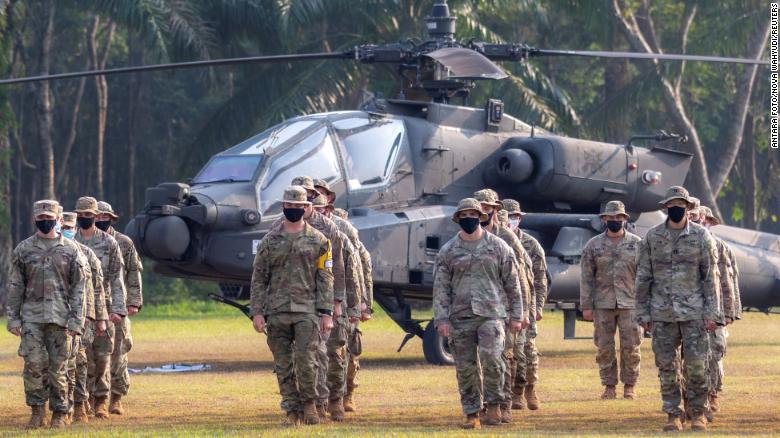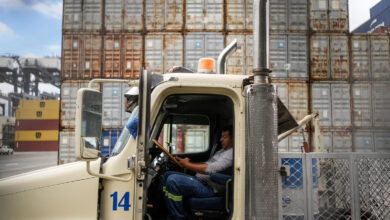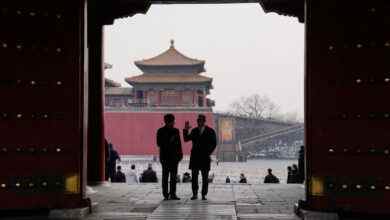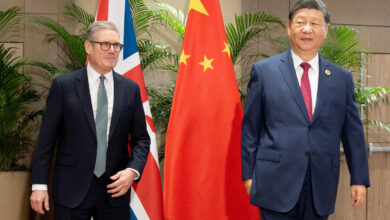
Jakarta, Indonesia (CNN) – The Indonesian and United States militaries are expanding their annual bilateral exercises to 14 participating countries, the Indonesian Army said in a news release Thursday.
Troops from the United Kingdom, Australia, Japan, Malaysia, Singapore and Canada will be among those joining the Garuda Shield 2022 exercises from August 1 to 14, the army said. The 16th edition of the war games will include live-fire exercises, special operations and aviation components among other disciplines, it added.
The expansion of the exercises comes at a time of simmering tension in the region, with analysts saying the move signals Indonesia has moved closer to the US than China in military cooperation.
Last year’s Garuda Shield involved two US Army divisions — about 1,000 soldiers — as well as their Indonesian counterparts in what the US Army said was the largest edition of the war games to date.
“The two-week Garuda Shield joint-exercise continues to solidify the U.S. — Indonesia Major Defense Partnership and advances cooperation in support of a free and open Indo-Pacific region,” a US Army statement said in advance of last year’s exercises.
Indonesia did not give an estimation of how many troops from each of the 14 countries would participate in this year’s Garuda Shield.
The US military and US Embassy in Jakarta had no immediate comment on the exercises.
South China Sea disputes
Indonesia sits on the southern edges of the South China Sea, which has been a hotbed of military activity over the past few years as China has militarized disputed islands there and the US and its partners have challenged those claims.
In March, China’s state-run Global Times tabloid accused US Adm. John Aquilino, the head of the US Indo-Pacific Command, of attempting to copy the Ukraine crisis in the Asia-Pacific, rallying allies, partners and other countries in the region to confront China.
The Global Times comments came after Aquilino took journalists on a flight over the South China Sea to highlight Beijing’s militarization of the disputed islands.
Analysts say Indonesia has long tried to avoid taking sides in the US-China dispute in the South China Sea.
But they note that in the past year Beijing has been assertive in pushing its claims near the Natuna Islands in an area inside Indonesia’s Exclusive Economic Zone but also inside China’s “nine-dash line,” under which Beijing claims control over almost all of the South China Sea.
Col. Frega Wenas Inkiriwang, North Jakarta Military District commander and lecturer at the Indonesian Defense University, said China’s current behavior is increasing the risk of conflict in the region as nations boost their military presence, including Indonesia, which has strengthened its forces around the Natuna Islands.
But don’t expect Jakarta to call out Beijing directly, said Collin Koh, a research fellow at the S. Rajaratnam School of International Studies in Singapore.
Indonesia “may avoid megaphone diplomacy and directly confronting … China over the South China Sea issues, but it’ll undertake actions that subtly signal to Beijing — and back home to the domestic audience — its desire to safeguard its national interests,” Koh said.
He called the expansion of the Garuda Shield war games “especially noteworthy” as “Indonesia is always cautious about signaling where it comes to sensitivities surrounding the South China Sea issues” and its ties with the United States and China.
“Clearly Indonesia wishes to engage in external balancing in the South China Sea, while using this as a platform to project its stature and influence in terms of multilateral defense diplomacy,” Koh said.
Frega noted that Indonesia and China once held joint military exercises called “Sharp Knife,” but the last iteration of those was in 2014.
Now, he said, in terms of military cooperation Indonesia is clearly closer to the US than China.
Frega also said Indonesia has long maintained close military ties with Japan and Australia, so their inclusion in Garuda Shield 2022 should not be surprising.
But he said, because Japan and Australia like the US have been highly critical of China’s actions in the South China Sea, the news of the August exercises could be expected to be “received uncomfortably” in Beijing.




